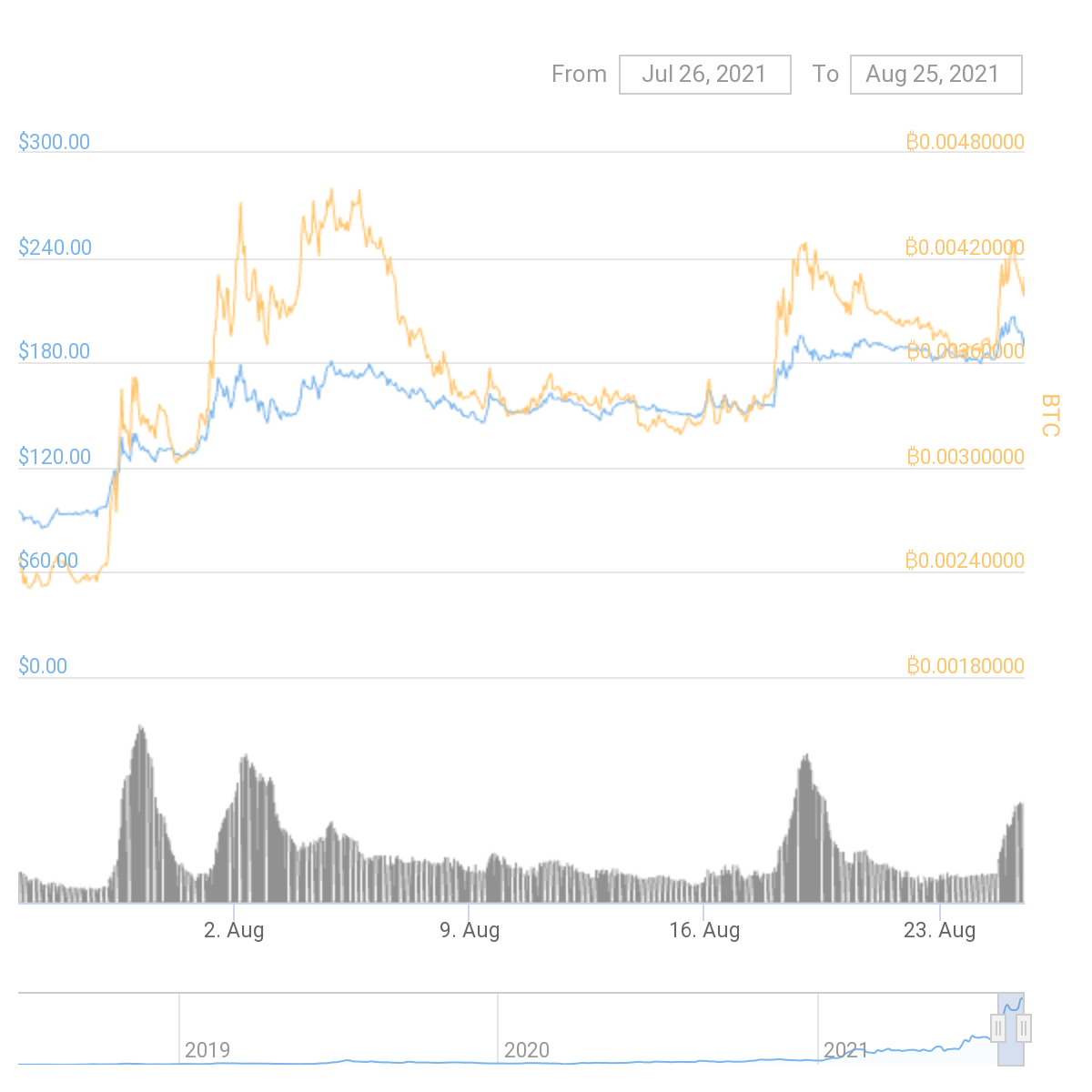Quant (QNT) Headed for $200 on Thin Volumes

Quant (QNT) only took a brief breather before attempting a new series of all-time highs, potentially shooting above $200. The chief booster for QNT comes from its Coinbase listing, exposing the asset to direct USD-driven buying.
Hunger for new digital assets coincides with significant limitations for US-based traders. The selection of assets available through the Coinbase exchange thus represents the taste for risk for new coins. For now, the QNT trading pair is relatively illiquid, allowing for dramatic price moves in either direction.
QNT traded at $196.59, up more than 5% in the past day. The asset was a rarity as most of the market turned red, with BTC taking a downturn toward $48,000.
For QNT, trading volumes are near peak levels, though still much slimmer in comparison to other hot coins. QNT only sees about $125M per day in trades, compared to more than $8B for Cardano (ADA). The current rally puts QNT close to the top 50 of assets by market capitalization, giving the project some additional visibility.
QNT Expects Bridges to Other Networks
Instead of competing, Quant protocol aims to expand its universe to other networks. QNT will thus bridge into already developed tokenized economies on Ethereum or Binance Smart Chain.
So far, Quant has set those features as promises, expecting significant upgrades to the protocol in the near future.
The Overledger Network, also known as OVN, is expected to boost demand for QNT and lock up a significant part of the supply. For now, the hype leading up to the actual launch may affect the QNT market price in the short term.
Is QNT a Long Term Investment
QNT has fluctuated between $192 in the previous July peak and a recent $150 bottom. Some early buyers view QNT as an early investment, with the potential to climb as high as $1,000 in the medium term.
Some extreme price predictions see QNT climbing among top coins with a price in the thousands of dollars.
However, the asset has also shown it can crash significantly in a short time span, making the predictions tentative and hinging on much higher trading activity.
Currently, all trading pairs for QNT have relatively low liquidity scores on CoinMarketCap, between 200 and 300 points, suggesting significant price slippage with even small-scale selling.
Quant Aims to Solve Speed, Interoperability Problem
Several crypto networks have attempted to offer cross-compatible tokenization. Currently, projects like Polygon (MATIC) and Polkadot (DOT) offer solutions based on smart contracts, which bridge token balances between networks. The Quant network is still using Ethereum for most of its technological solutions, and QNT still exists as an ERC-20 token, with no deadline to create a separate main network.
Binance Smart Chain also carries versions of some tokens, and similar technologies have been used by THORChain (RUNE).
The Overledger network is an open protocol that will include gateways with the ability to connect to any distributed ledger. The launch of gateways has been expected for months, and the technology will be open to community participants. Gateways will have accessible dashboard operation capabilities and in theory can expand to any distributed ledger.
Is Quant Running Late
One of the problems for QNT is that its price has rallied in the past, based on significant hype. The promise of Overledger Network (OVN) has been repeated multiple times over the past year, with no fixed date for the launch of gateways.
Still, the long game for QNT is an attempt to establish the network among the leading platforms, adding to the growth of the crypto economy. One of the benefits from launching gateways would be the opportunity to stake QNT as a source of passive income. Currently, QNT accrues small staking rewards by simply being held in a wallet.
Can Quant Assist Central Banks
One of the more ambitious claims of Quan is that Overledger Network will also be capable of carrying Central Bank Digital Currencies (CBDCs).
The Quant community comments on the possibility that the project team has reached out to central regulators, and is yet to disclose decisions on launching a new type of digital cash.
The bid of Quant resembles that of Ripple and XRP, which claimed to be able to replace interbank transfers with its distributed ledger network. For now, most central banks have been very tentative on an actual CBDC launch, while limiting their activity to research the viability of a blockchain-based dollar or euro.
So far, the US Fed has only mentioned the potential for “programmable money”, as it uses the term for cryptocurrencies. However, CBDCs are viewed with some skepticism by the crypto community, due to being centralized and potentially controllable.

With over 50 coins and an obsession with security, Kraken is one of the safest places to buy and trade crypto.

Kraken has a good reputation for security and protection of your funds and operates across the USA (except NY), Canada, the EU and Japan

From Airdrop to Wallet we look at all the crypto jargon and what it really means

Who are the biggest influencers in the NFT space across the various social media platforms.

The first cryptocurrency. It has limitations for transactions but it is still the most popular being secure, trusted and independent from banks and governments.

An early alternative to Bitcoin, LTC aimed to be a coin for easy, fast, low-fee spending. LTC offers a faster block time and a higher transaction capacity in comparison to Bitcoin.